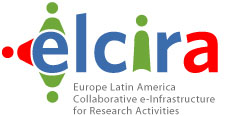 |
|
||||||
 |
|||||||
|
Authentication, Authorisation and Identity Federations in Latin America ELCIRA aims "to promote the trustworthy exchange of information between research groups in
Latin America and Europe by fostering the creation of federations for Taking advantage of Brazilian experience in the implementation of the identity federation CAFe (The Federated Academic Community) - service in operation since the second half of 2010, that gathers research and education institutions in Brazil - RNP will coordinate ELCIRA's WP2 - Coordinated Actions for AAI between EU and LA, with the aim of promoting and consolidating the foundations for creating a framework for authentication and authorisation in Latin America, including academic services and processes. Actions will be structured and carried out within the scope of RedCLARA, allowing other NRENs to establish their own regional federations initiatives. It is also envisioned and aimed the integration with the European initiatives under TERENA activities such as TF-EMC2 and REFEDS, and will make the necessary arrangements to join the GÉANT service eduGAIN. About CAFe: The Federated Academic Community (CAFe) is an identity federation that gathers teaching and research institutions in Brazil. Through CAFe, a user keeps all its information at the home institution and can access services offered by the institutions participating in the federation. Institutions belonging to the Federation may act as identity providers (IdP) and as service providers (SP). RNP-user organizations acting as identity providers currently have a full allowance in the price associated with the use of the CAFe’s service. Moreover, none of the current agreements provide any cost to service providers. RNP is responsible for managing the service and maintaining the repository centralized with data on members of the Federation. CAFe allows each user to have a single account at their institution of origin, valid for all services provided to federation, eliminating the need for multiple passwords and registration processes. The trustworthy relationship between participating institutions of the Federation allows the user to authenticate only in its origin institution, which provides guarantees of authenticity and credibility necessary to the others. Several countries already have federations in operation or under implementation. Within educational institutions networks, the services of distance learning and collaboration activities are among the biggest beneficiaries of the infrastructure provided by the federations. Learn more about CAFe, here: http://portal.rnp.br/web/servicos/cafe-en
|
|||||||
|
|||||||
